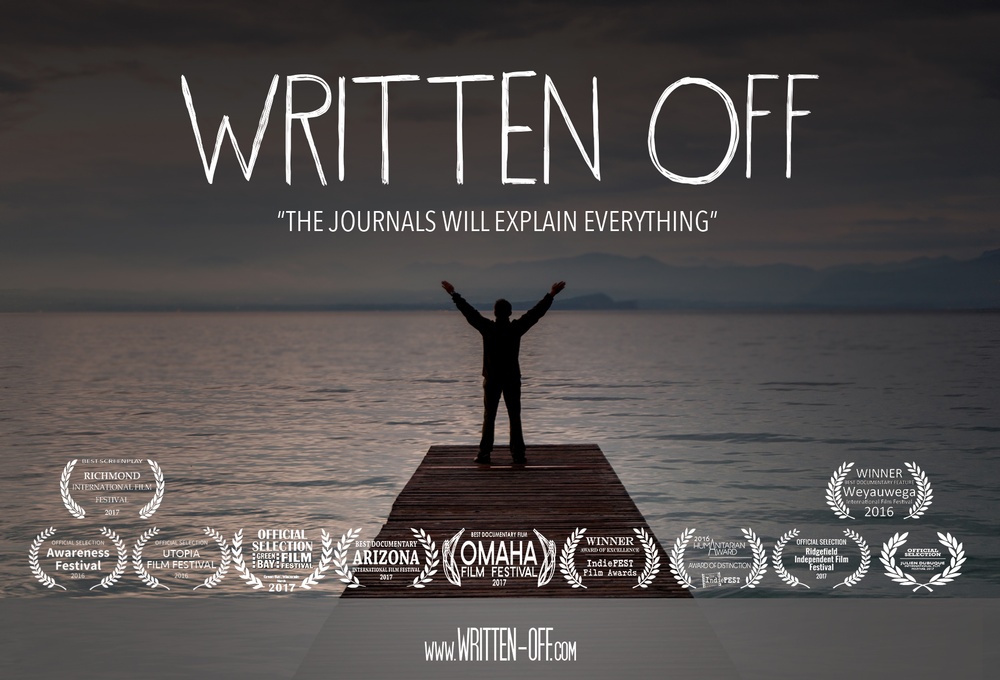Lessons Learned - Telling the story of Matt Edwards
 The Biscuit Factory" />
The Biscuit Factory" />

I’VE LEARNED A FEW THINGS since beginning the journey of producing the documentary Written Off.
I’ve learned that no matter how hard you try, it’s impossible to get in front of something. The country is too big, the people too busy living their lives and focusing inward. There are too many competing issues trying for a slice of the pie.
I’ve learned that talking about death is considered rude. That people are fragile and try to shield themselves from bad news.
I’ve learned that parents who have children struggling with substance abuse disorder are some tough cookies. That love for a child is the deepest and most endless, no matter how old that child is, no matter how troubled. I’ve learned that parents who have lost a child can be a powerful force, that anguish and anger can energize.
I’ve learned that fear of what other people think, shame and stigma, can paralyze. That it’s possible to build walls out of secrets, to turn your reality inside out so one knows the real you.
I embarked on this project because my cousin, Emily Applegate, died of a heroin overdose 21 years ago. She was super tall with a giant mop of curly dark brown hair. She was a star basketball player, a small town girl. Her absence is a drumbeat of sadness in my family, but I never understood how she got from point A to point B. When I started reading about this thing we now call a crisis, about kid after kid overdosing, I wanted to figure it out.
I found a different story – a young man who also had a ton of potential – named Matt Edwards. He kept diaries chronicling his dangerous journey. His mother, Jane, shared them with me along with boxes of photos, voicemails, emails and the rest of his things. I think Matt was better at the secret life than Emily. He lived it longer, more people believed his lies, but what he wrote down was the true story and from it I also discovered some of what must have happened to her.
I learned that addiction isn’t a party. Matt’s life wasn’t fun, getting high was just a temporary escape from terrible pain. Somehow I think I knew that, but naming it frames everything differently.
I learned that a missing ingredient in substance abuse disorder, compared to other chronic or terminal diseases is empathy. Matt once explained his medication intake and gaunt appearance to co-workers at Wal-Mart with the lie that he had cancer. He was hugged and hugged, there were tears and well wishes. It was the kind of support that humans need, but that he’d never gotten by telling the truth.
I learned that breaking social contracts – lying, stealing, betraying trust – gives people permission to draw the line, to write you off. But ‘once a liar, always a liar’ is too simplistic. Matt lied up and down the street, but comparing his journals to what he told his friends shows that he told the truth whenever he could. He craved the truth, but too much of it would bring down the wall of secrets.
I learned that loved ones eat blame, bite by bite, like poison. I learned that forgiveness isn’t easy.
I learned that it’s hard to keep the real person in mind. Emily broke into a house, stole a wallet and then dressed up like its owner – an Indian man – in a turban and brown make-up, tried to cash his paycheck at a 7-11, and got arrested. Matt got a doctor to agree to give him a colostomy, because he knew it would be a gateway to unlimited prescription painkillers. But that’s not who either of them really were. When I travel around with the film, the survivors in every audience speak bravely from a raw place, reclaiming their dignity. Rejoining the world after having been stripped of their personhood by their own versions of the unnecessary operation or the check cashing arrest.
I learned that the more you have against you, the harder it is to find a reason to live or try to get clean. That problems pile up – being poor, being a felon, being on parole. I learned that whole systems are broken. That the world wasn’t made for people who can’t follow all the rules.
I learned that true desperation is terribly lonely. It breaks my heart that neither Matt nor Emily would have known that it wasn’t their fault. Matt blamed himself continuously in his journal. He didn’t know he couldn’t solve it by himself, but he sure tried. He would count down the days without drugs – rejoicing at his strength until he would eventually, always, have to start over at zero.
I’ve learned that while being an outsider or feeling invincible might make someone more susceptible, it’s not about being a bad kid. It’s not about bad parenting.
I’ve learned who is to blame – corporate greed that has killed more people than the Vietnam War. They’ve tried to remain faceless but there are actual people responsible. Not Matthew Edwards or Emily Applegate, but actual people who made a ton of money from their deaths like Richard Sackler and Beverly Sackler and David Sackler and Ilene Sackler Lefcourt and Jonathan, Kathe, Mortimer and Theresa Sackler. I think we’ll look back at this era as a low point for capitalism. But I hope we also regard the young lives lost, the holes left in families, the potential gone from the world with a fury that changes the future.
I’ve learned that memory is important. Remember Emily for her sweet goofiness, for her talent on the court, for her loyal friendship. Remember Matt as an intellectual, a spirited conversationalist, a hopeful world traveler. Remember them all.
-MH